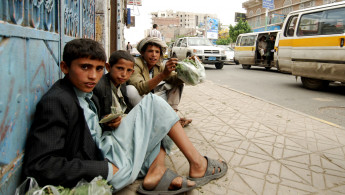Qat: Yemen's cash crop is poisoning the nation
For thousands of years, qat (also spelled "khat") has been an integral part of the social lives of Yemenis. Qat is to Yemen what coffee is to Egypt, an important social custom rooted in history.
The leaves are picked off and chewed for hours on end, with the user getting a high similar to strong coffee. Although it is nowhere near as harmful as heroin or alcohol, there are grave concerns in the health community about the drug that continues to be widely used in the country.
Widespread practice
A World Health Organisation (WHO) report said that 90 percent of adult men and 50 percent of women in Yemen consume the drug for between three and four hours a day.
The WHO also say that despite almost half of the country living in poverty, up to 50 percent of household incomes are spent on qat. Meanwhile, the water-intensive farming of the plant is sucking the country dry.
| The crops are often cultivated with the help of cheap pesticides that are smuggled into Yemen. |
But more worrying for health workers is that a growing number of users are children, some as young as ten. The World Bank says that 15-20 percent of children under 12 chew qat.
Ali Mohammed, a father of four, says that his ten-year-old son regularly consumes qat.
"I cannot stop him chewing it and I am forced to give him some qat on special occasions so he does not go and chew it behind my back with the wrong people."
It is common for parents to chew the plant at home and many are unaware of the dangers of the drug, which includes suppressing appetite and making mental illnesses in users worse. Some parents even encourage their children to consume qat, seeing it as a sign of maturity. Other children simply imitate their parents and peers by chewing the plant.
However, the majority of children who use the drug frequently are also the most vulnerable. Child labourers and street children use qat to help them endure long working hours or the monotony of life on the streets.
Some believe that qat will bring success to their life. But in some cases, qat can lead to death, as was the case with a boy in south east Sanaa, who choked to death on the plant while playing football.
Toxic plant
Qat is grown extensively in Yemen, and it is an important cash crop for many families. But the crops are often cultivated with the help of cheap pesticides that are smuggled into Yemen.
Highly toxic, these chemicals can lead to respiratory problems and skin diseases, even cancer. It is having a devastating impact on the thousands of child labourers who till the fields of this agriculturally-reliant country.
Mohammed Ghanem told al-Araby al-Jadeed that his son developed throat cancer when he worked on a qat farm. Ghanem says that his child would often consume the plant.
"I spent a long time going from one hospital to another to save my eldest son, but to no avail. Then I travelled to Egypt to continue my son’s treatment, which cost me a large amount of money," he says.
Dr Rami al-Maqtari confirmed the negative health effects of qat on children in Yemen. "The effects are no secret to parents, but they do not care because they see the child moving and not debilitated by illness," he said.
Dr Maqtari said that chewing qat could lead to a number of forms of cancer, in addition to malnutrition, due to children not eating while high on the drug. It is also known to stunt adolescents' growth, and lead to digestive problems.
Dr Maqtari warns pregnant women not to chew qat, as the plant and the pesticides can have adverse effects on the foetus.
| Click here to read about Yemen's other famed agriculture export |
Beating the drug
The Democracy School is a non-governmental educational institution that was established by Yemen's "Children's Parliament".
It was created to give children a space to voice their opinions and serve as an alternative to using the drug. Jamal al-Shami, the director of the school, says that one of the main conditions for accepting children into the Democracy School is that they should not consume qat.
"Those caught chewing the plant are expelled," he said.
The Children's Parliament has demanded that the Yemeni government ban the use of qat by children under the age of 17. This comes another another 11-year-old boy choked to death while chewing qat. The parliament also called on the government to launch an awareness campaign in rural areas to stop children from taking the drug.
A study conducted by the researcher Najat Khalil has concluded that qat use is more prevalent among boys than girls. Children who work to assist their families in farms or workshops are also far more likely to take the drug.
Out of the 400 children surveyed, 36 percent said they were supplied qat by their parents, and 40 percent chewed the plant for the first time after their parents gave them the drug. Although the dangers are more frequently highlighted, it appears that traditions are trumping common sense.
This article is an edited translation from our Arabic edition.



